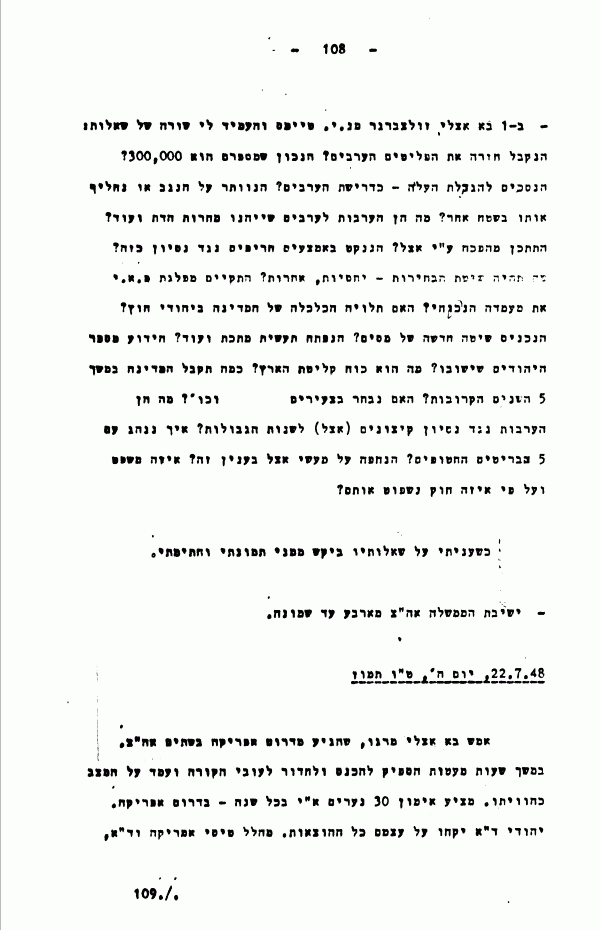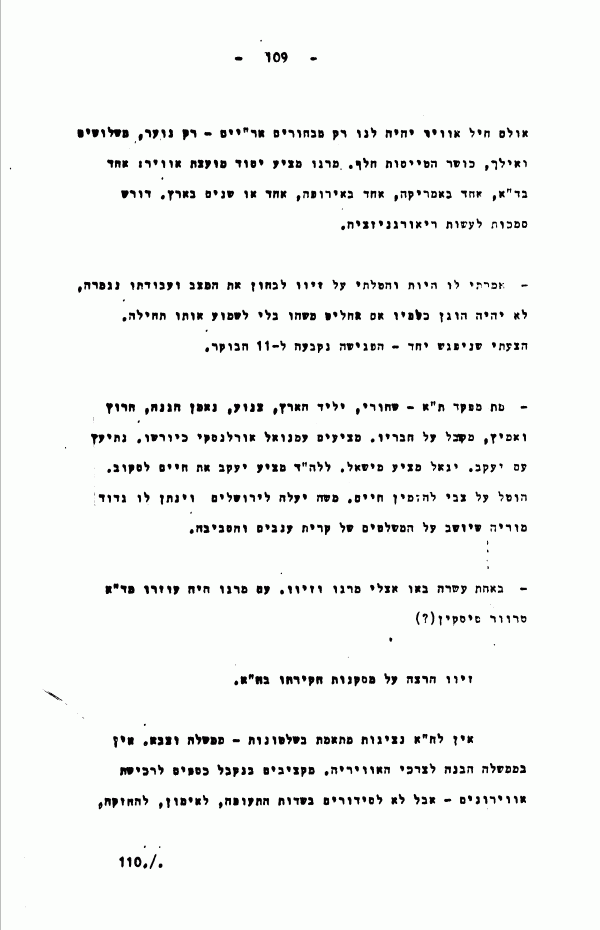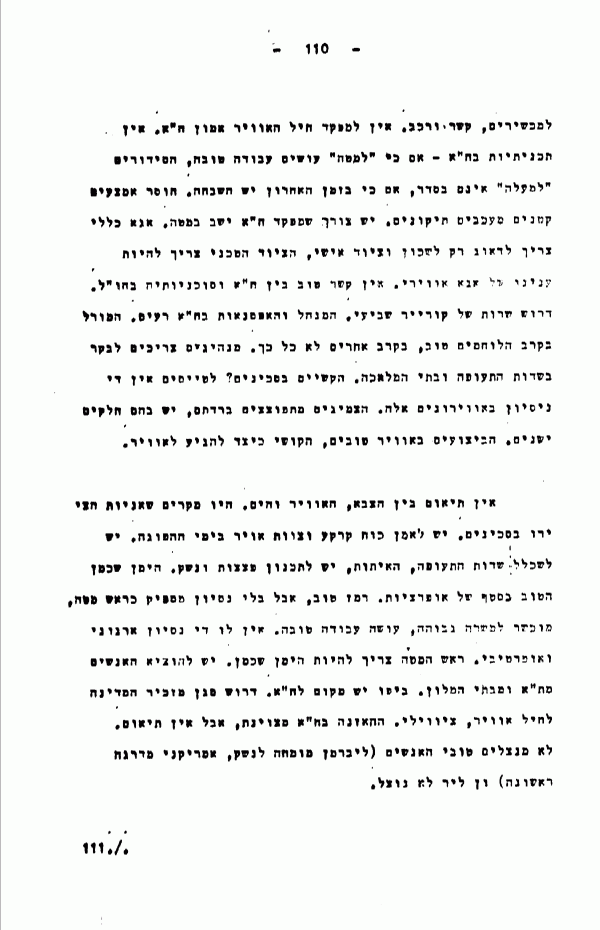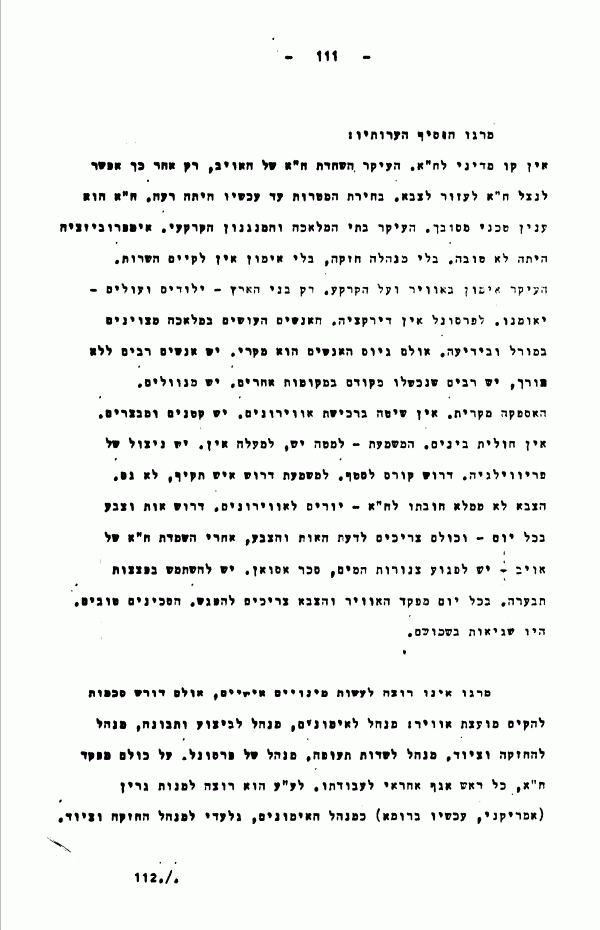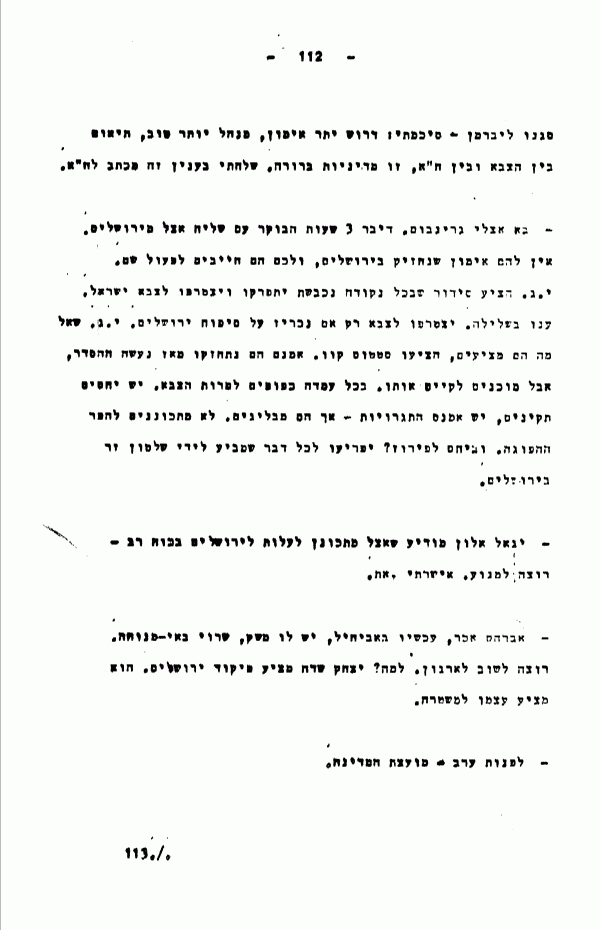Thursday, July 22, 1948
[Cecil] Margo, who'd arrived from South Africa at 2 p.m., came to see me last night. Within just a few hours he managed to uncover the inner workings [of the Air Force] and assess the situation as it stands. He proposes training 30 Eretz-Israeli youths [young men] every year - in South Africa. South African Jews will cover all the expenses. He's full of praise for pilots from America and South Africa. But for the Air Force we'll only have Eretz-Israeli men - only young ones. From [age] thirty onwards, fitness for flight declines. Margo suggests establishing aeronautical councils. One in South Africa, one in America, one in Europe, one or two in the country. He asks for the authority to undertake a reorganization.
I told him that because I had tasked [Marcus] Sieff with assessing the situation and his task was completed, it would not be fair to him if we decide something without first hearing him out. I suggested that we all meet - the meeting was set for 11 a.m.
- The Tel Aviv commander died - [Yisrael] Shchori, a native of the country, modest, loyal to the Haganah, brave and hard-working, popular among his friends. Emanuel Orlansky [Nishri] is being proposed as his successor. We'll consult with Ya'akov. Yigael [Yadin] proposes Mishal [Shacham]. For the Training Bureau Ya'akov proposes Haim Laskov [instead of Eliahu Ben-Hur]. Zvi [Ayalon] was tasked with summoning Haim. Moshe [Dayan] will go to Jerusalem and receive the Moriah Battalion, which is holding the strongholds of Kiryat ''Anavim and surroundings.
- At 11 Margo and Sieff arrived. Margo was accompanied by his assistant from South Africa, Trevor Suskin (?).
Sieff presented the conclusions of his investigation of the Air Force: The Air Force lacks a coordinating representative among the ruling bodies - the government and the army. The government lacks a structure for the air fleet's needs. They readily allocate funds for the purchase of airplanes - but not for arrangements involving airfields, training, maintenance, equipment, signal, and vehicles. The Air Force commander [Y. Amir] has no air force training. There's no planning in the Air Force - although they do good work "below." The arrangements "above" are not good, although there's been some improvement recently. A lack of small instruments delays repairs. The Air Force commander should be part of the [General] Staff. The General [Staff] Logistics Department should only be concerned about housing and personal equipment. Technical equipment should be the purview of the Air Force's Logistics Department. The connection between the Air Force and its agencies abroad is not good. Weekly courier services are needed. The administration and logistics in the Air Force are bad. The morale among fighters is good, not so good among others. Leaders [squadron commanders] need to visit the airfields and workshops.
[What's the reason for the] problems with the "Knives" [Messerschmitts]? - The pilots don't have enough experience with these planes. The wheels explode when they land, the parts are old. The flight maneuvers are good. The difficulty - how to get airborne.
There's no coordination between the army, the air [Air Force], and the sea [Navy]. There were instances in which naval ships fired at "Knives." During the truce a ground force and aircrew should be trained. Need to upgrade the airfields, signal [communication system]. Need to plan bombs and weapons. Hyman Shechtman [Shamir] is the best of the operations staff. [Aharon] Remez is good, but doesn't have enough experience as chief of staff. He's qualified for a high-ranking position, does good work. Doesn't have enough organizational and operational experience. Chief of staff should be Hyman Shechtman. Need to get the men [Air Force volunteers from abroad and staff] out of Tel Aviv and the hotels [where they were accommodated when the Air Force was being formed]. There's space for the Air Force in Jaffa.
The Air Force needs a deputy secretary of state [deputy minister], a civilian. The listening [?] in the Air Force is excellent, but there's no coordination. They don't make good use of the best men ([Yosef] Lieberman is a weapons expert, American, top-tier); Van Leer isn't being put to good use.
Margo added his own comments: The Air Force lacks a policy. The most important thing is destroying the enemy's air force. Only after that can the Air Force be used to help the army [land forces]. To date the targets have been poorly selected. The Air Force is a complex technical matter. The most important thing - workshops and the apparatus on the ground. Improvisation hasn't been good. Without a strong administration, without training, the airfields cannot be sustained. The most important thing - training in the air and on the ground. Only countrymen - natives and immigrants - will be trained. The personnel lack direction; the people doing the work are excellent in terms of morale and knowledge, but recruitment is random. There are many unnecessary people, there are many who failed earlier elsewhere, there are contemptible types. Provision of supplies is random. There's no method to the purchase of airplanes. There are small [planes] and [Flying] Fortresses. There's no intermediary link. Discipline - at the bottom it exists, at the top - it doesn't. Privilege is exploited. A course is needed for the staff. Discipline requires someone forceful, not vulgar. The army isn't fulfilling its duty to the Air Force - shooting at airplanes. Need a signal and a color for each day - and everyone should know the signal and the color. After destroying the enemy's air force [Cecil Margo suggests] - strikes should be launched against the water pipes, Aswan Dam. Incendiary bombs should be used. The Air [Force[ and army commander[s] need to meet every day. The "Knives" are good. There were mistakes in the way they were used.
Margo doesn't want to make individual appointments. But he requests the authority to establish an aeronautical council: an administration for training, an administration for operations and intelligence, an administration for maintenance and equipment, an administration for airfields, an administration of personnel. The Air Force commander oversees all of them. Each department head is responsible for his work. For now he wants to appoint [Harold] Green (an American, currently in Rome) as director of training, [Yehuda] Giladi as director of maintenance and equipment, his deputy - [Yosef] Lieberman.
I summarized: [We] need more training, better administration, coordination between the army and the Air Force. This is a clear policy. I sent a letter regarding this matter to the Air Force.
- [Yitzhak] Gruenbaum came to see me. He spent 3 hours this morning talking to the ETZEL delegate from Jerusalem; they don't have faith that we'll hold on in Jerusalem, and therefore they must take action there. Y. G. suggested an arrangement whereby at each location conquered [in the city] they'll disband and join the Israeli army. They rejected this. They'll join the army only if we announce Jerusalem's annexation. Y. G. asked what they suggest. They suggested status quo. Although [according to them] they've grown stronger since the arrangement [with the IDF] was reached, they're still prepared to uphold it. At each outpost they're subordinate to the army's authority. The relations are proper, although there are provocations - but they overlook them. They don't intend to violate the truce. And regarding demilitarization? They'll disrupt any process that leads to foreign rule in Jerusalem.
Yigal Allon reports that ETZEL is planning to enter Jerusalem with a strong force - he wants to prevent this. I authorized it.
- Avraham Ikar, now in Avihayil, has a farm, he's restless. Wants to come back to the Organization [formerly a term for the Haganah, now meaning the army]. In what [role]? Yitzhak Sadeh suggests the Jerusalem command. He suggests himself for the police.
- Early evening - State Council.





